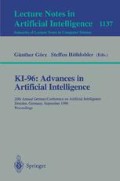Abstract
Current probabilistic expert systems assume complete knowledge of the joint distribution. To specify this distribution one has to construct a directed acyclic graph attached by a lot of tables filled with conditional probabilities. Often these probabilities are unknown and the quantification is more or less arbitrary. SPIRIT is an expert system shell for probabilistic knowledge bases which uses the principle of maximum entropy to avoid these lacks. Knowledge acquisition is performed by specifying probabilistic facts and rules on discrete variables in an extended propositional logic syntax. The shell generates the unique probability distribution which respects all facts and rules and maximizes entropy. After creating this distribution the shell is ready for answering simple and complex queries. The process of knowledge acquisition, knowledge processing and answering queries is revealed in detail on a nontrivial example.
Preview
Unable to display preview. Download preview PDF.
References
P. Cheeseman (1983). A method of computing generalized Bayesian probability values for expert systems. Proc., 6.th Intl. Joint Conf. on AI (IJCAI-83), Karlsruhe, Germany, 198–202.
Csiszár, I.; I-divergence Geometry of Probability Distributions and Minimization Problems, Ann. Prob. 3, S. 146–158, 1975.
Hájek, P.; Havránek, T.; Jiroušek, R.; Uncertain Information Processing in Expert Systems, CRC-Press, Boca Raton, Florida, 1992.
Jensen, F.V.; Jensen, F.; Optimal junction trees, in: Proceedings of the Tenth conference on Uncertainty in Artificial Intelligence, Ramon Lopez de Maturas, David Poole (eds.) Morgan Kaufmann Inc., 360–366, 1994.
Kane, T.B.; Reasoning with Maximum Entropy in Expert Systems, W.T. Grandy, Jr. and L.H. Schick (eds.), Maximum Entropy and Bayesian Methods, 201–203, 1991
Kjaerulff, U.; Triangulation of graphs — algorithms giving small total state space, Technical Report R90-09, Dept. of Mathematics and Computer Science, Aalborg University, 1990.
Lauritzen, S.L.; Spiegelhalter, D.J.; Local Computations with probabilities on graphical structures and their application to expert systems, J. Roy. Stat. Soc. Ser. B, 50, 157–224 (with discussion), 1988.
Lauritzen, S.L.; Thiesson, B.; Spiegelhalter, D.J.; Diagnostic systems by model selection: a case study, in: Selecting Models from Data, Lecture Notes in Statistics 89, P. Cheeseman and R.W. Oldford (eds.), Springer, 143–152, 1994.
Lemmer, J.F.; Generalized bayesian updating of incompletely specified distributions, Large Scale Systems, 5, 1983
Lemmer, J.F.; Barth, S.W.; Efficient minimum information updating for bayesian inferencing, in: Proc. Nation. Conf. on Artificial Intelligence AAAI, Pittsburgh, 1983
Neapolitan, R.E.; Probabilistic Reasoning in Expert Systems — Theory and Algorithms, John Wiley & Sons, New York, 1990.
Nilsson, N.J.; Probabilistic Logic, Artificial Intelligence 28 (no.1): 71–87. 1986
Paris, J.B.; Vencovská, A.; A Note on the Inevitability of Maximum Entropy, Int. J. Approximate. Reasoning, 4, 183–223, 1990.
Pearl, J.; Probabilistic Reasoning in Intelligent Systems, Morgan Kaufmann, San Mateo, California, 1988
Shore, J.E.; Relative Entropy, Probabilistic Inference, and AI, in: Uncertainty in Artificial Intelligence, ed. L.N. Kanal and J.F. Lemmer, North-Holland, 1986
Shore, J.E.; Johnson, R.W.; Axiomatic Derivation of the Principle of Maximum Entropy and the Principle of Minimum Cross Entropy, IEEE Trans. Inform. Theory IT-26,1,26–37, (see also: comments and corrections..., in IEEE Trans. Inform. Theory IT-29, 1983), 1980
Tarjan, R.E.; Yannakakis, M.; Simple linear-time algorithms to test chordality of graphs, test acyclicity of hypergraphs and selectively reduce acyclic hypergraphs, SIAM J. Comp.,13, 566–579, 1984.
Wen, W.X.; Minimum Cross Entropy Reasoning in Recursive Causal Networks, in: Uncertainty in Artificial Intelligence 4, ed. R.D. Shachter, T.S. Levitt, L.N. Kanal, J.F. Lemmer, North-Holland, 1990
Whittaker, J.; Graphical Models in Applied Multivariate Statistics, John Wiley & Sons, New York, 1990.
Norsys Software Corp.; Library of Bayesian — Networks, available at the WWW under URL: http://www.norsys.com/networklibrary.html
Author information
Authors and Affiliations
Editor information
Rights and permissions
Copyright information
© 1996 Springer-Verlag Berlin Heidelberg
About this paper
Cite this paper
Meyer, CH., Rödder, W. (1996). Probabilistic knowledge representation and reasoning at maximum entropy by SPIRIT. In: Görz, G., Hölldobler, S. (eds) KI-96: Advances in Artificial Intelligence. KI 1996. Lecture Notes in Computer Science, vol 1137. Springer, Berlin, Heidelberg. https://doi.org/10.1007/3-540-61708-6_67
Download citation
DOI: https://doi.org/10.1007/3-540-61708-6_67
Published:
Publisher Name: Springer, Berlin, Heidelberg
Print ISBN: 978-3-540-61708-2
Online ISBN: 978-3-540-70669-4
eBook Packages: Springer Book Archive

